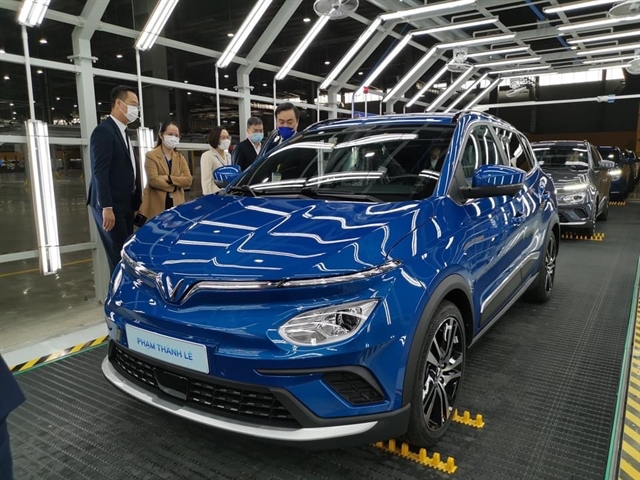 Economy
Economy

 |
| VF e34, the first model developed by Vietnamese automaker VinFast, has seen a sudden sales surge and is ranked 8th in the list of best-selling cars in the Vietnamese market in July 2022. — Photo muaxegiatot.vn |
HÀ NỘI – The Vietnamese electric vehicle market promises to be more exciting after many years of consumers saying no to hybrid and e-cars, industry insiders said.
Experts believe that Vietnamese people have gradually opened their hearts to green cars. In the next few years, when traffic infrastructure and e-vehicle charging stations are widely available, electric vehicles will be chosen by local users.
Việt Nam’s middle class is growing and live in urban areas while e-vehicles meet the criteria of smart cities, thus people are shifting to green cars that help reduce environmental pollution.
According to experts, the electric car segment has begun to diversify with a series of outstanding cars, from popular to luxury. Vietnamese automaker VinFast has entered the e-vehicles market at a “golden time” as sales volume of electric vehicles has begun to increase.
VinFast has entered countries where the popularity of e-vehicles is sharply increasing, such as the US, France, Germany, the Netherlands and Canada.
The Vietnam Automobile Manufacturers Association (VAMA) reports that the VF e34, the first model developed by Vietnamese automaker VinFast, has seen a sudden sales surge and is ranked 8th in the list of best-selling cars in the Vietnamese market in July 2022.
In June alone, VinFast sold a total of 2,141 vehicles, reflecting a transition from petrol to electric cars. However, it saw sluggish sales in August due to a lack of components.
According to a recent report on Việt Nam’s electric car market published by the Vietnam Petroleum Institute, Việt Nam has great potential to develop this segment. If the Government implements supporting policies in a timely manner, Việt Nam can take the lead in electric car development in Southeast Asia.
The Vietnam Petroleum Institute reports that Việt Nam's automobile market still shows a lot of room to grow as car ownership remained low at 23 cars per 1,000 people while it is 1 in 10 people in Thailand and 1 in 20 in Malaysia.
Việt Nam is a land of great potential with a large population of nearly 100 million people and an undeveloped electric vehicle market. Meanwhile, electric vehicles are becoming a global trend and revenue from the electric vehicle segment is growing at 10 per cent a year, according to car experts.
They predict revenue from the electric vehicle market by 2025 will reach about US$60 billion.
VAMA has also proposed three scenarios for electric vehicles in Việt Nam, with all vehicles being electric by either 2035, 2045 or 2050.
According to the International Energy Agency, electric vehicle sales are on course to hit an all-time high this year, but more work is needed in other sectors to put the planet on course for net-zero emissions by 2050.
On the EV front, the IEA said global sales doubled in 2021 to represent nearly nine per cent of the car market. Looking forward, 2022 was expected to see another all-time high for electric vehicle sales, lifting them to 13 per cent of total light duty vehicle sales globally.
The IEA has previously stated that electric vehicle sales hit 6.6 million in 2021. In the first quarter of 2022, EV sales came to 2 million, a 75 per cent increase compared to the first three months of 2021.
Despite the outlook for EVs, the IEA separately noted that they were “not yet a global phenomenon. Sales in developing and emerging countries have been slow due to higher purchase costs and a lack of charging infrastructure availability.”
According to the IEA, sustained policy support is the main pillar. Public spending on subsidies and incentives for EVs nearly doubled in 2021 to nearly $30 billion. A growing number of countries have pledged to phase out internal combustion engines or have ambitious electric vehicle targets for the coming decades. -- VNS